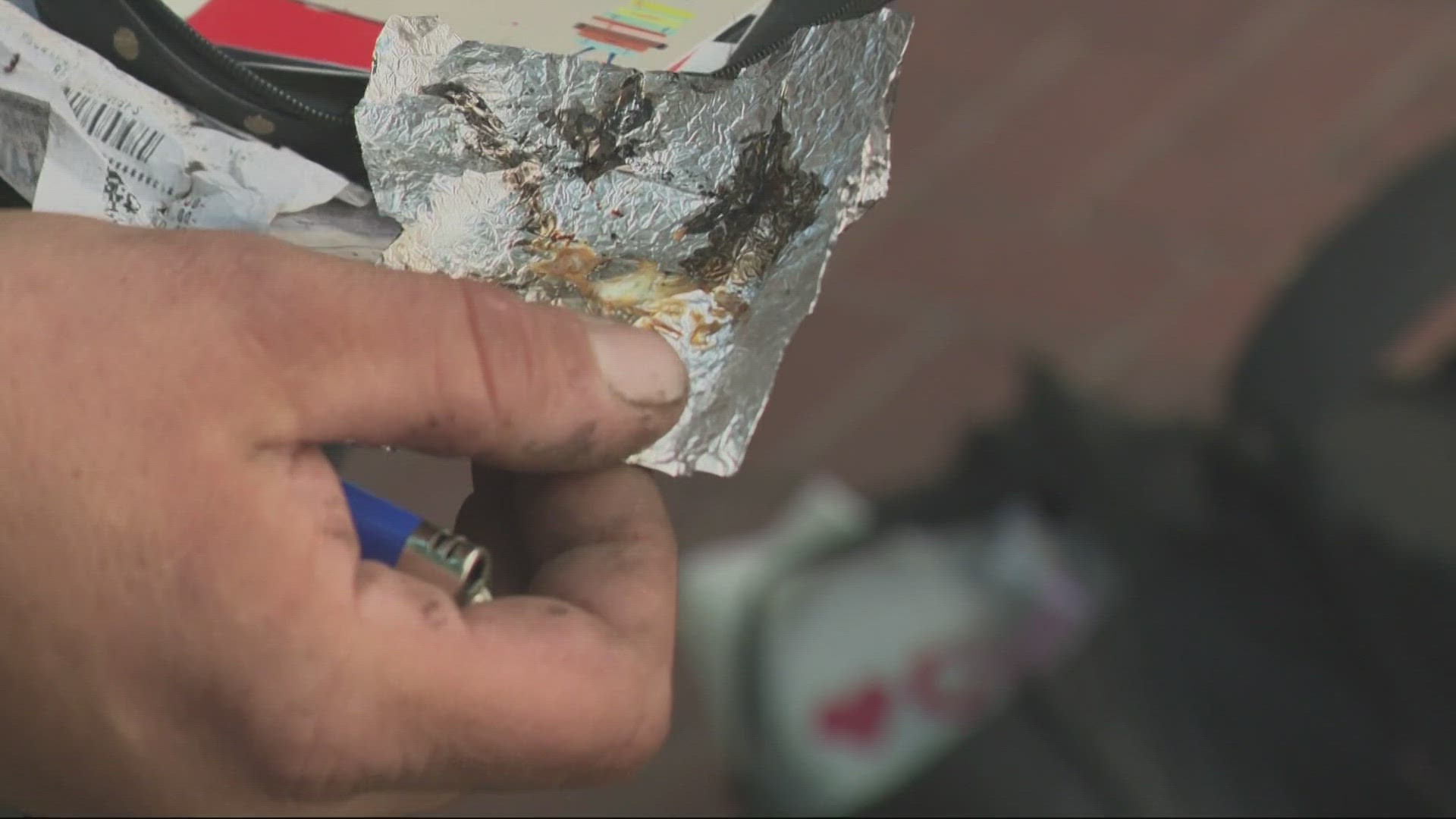PORTLAND, Ore. — The fingerprints of ongoing addiction are hard to miss in downtown Portland.
“The blues aren’t strong enough for me anymore,” said one man. He's turned to smoking powdered fentanyl instead of the ubiquitous blue faux-oxycodone pills, the ones usually stamped with "M-30."
Tools to smoke this deadly drug, it turns out, are just as accessible as the drug itself — more so, perhaps, because they come free of charge.
“There’s the exchange and then they set up at PSU park blocks and other parts of the town,” said Jade Wielder, who sat on a street corner zipped into the same sweatshirt as her boyfriend. She said it’s easy to find free tin foil and straws for smoking fentanyl, her latest addiction.
Housing programs like the one at Central City Concern also hand out smoking supplies. But often, substance users just turn to each other.
“We hand out so much tin foil ... most people boost it. We talk about charging people for it, but like, we did steal it,” Wielder said.
Drug users also find these supplies at Portland’s needle exchange programs, like the one run by Outside In in Southwest Portland.
“Our whole goal is to engage with the community, bring people in, provide them a safe space to be, ask questions, learn about drug use, for options to not use drugs and have the tools that they need to stay healthy and safe,” said Haven Wheelock, Outside In's harm reduction manager.
She said they hand out smoking supplies like glass pipes, tin foil and straws, along with the overdose reversal drug nalaxone. They’ve been practicing this method of harm reduction since 1989 — one of the older harm reduction programs in the country. It’s in an effort to prevent the spread of disease that can come from sharing. It’s also a way they build relationships with people on the streets.
One man waiting in line outside the needle exchange Tuesday told KGW he was there to pick up a bubble and a meth pipe. “Just to get the things I need for my addiction,” he said. He’s also been connected with treatment services through the needle exchange program.
“The longer we can keep people smoking the safer they’re going to be,” said Wheelock. “We know that injecting drugs is much more dangerous than smoking them.”
Meanwhile, Portland is seeing a record number of overdoses from people using fentanyl. Mayor Ted Wheeler spoke out against this approach to harm reduction on Monday after Multnomah County started handing out the same tools.
“I don’t see how handing out tin foil clean dirty or otherwise is going to prevent the spread of disease," said Wheeler. "What it’s going to do is encourage people to come to Multnomah County and smoke fentanyl.”
But people committed to harm reduction, like Wheelock at Outside In, just don't agree. To them, substance users are going to use — they're already using. So it's best to keep them as safe as possible, and keep them in touch.
“We hear the enabling argument a lot,” Wheelock added. “You know we enable people to be as healthy as possible with wherever they are in their addiction. We enable people to stay alive.”
The county abruptly halted its harm reduction plans at the urging of County Chair Jessica Vega Pederson pending further analysis.
Vega Pederson put out an updated statement on Tuesday, underlining that she halted the county health department's plans primarily because of a breakdown in procedure:
"My decision to suspend Multnomah County’s distribution of smoking supplies was based on a lack of communication and poor due diligence by the Health Department. Neither my office nor our chief operating officer were alerted that this program would begin on July 3. As a result, this process lacked robust community engagement, a communications plan, and a system to track outcomes. We are also expanding our legal review, as the legality of the program starting on that date is in question.
"I am committed to efforts designed to reduce harm associated with the use of controlled substances, including fentanyl, and believe that they save lives. But outreach, accountability, and proper implementation are also key to our success in addressing the fentanyl and polysubstance abuse crisis."

